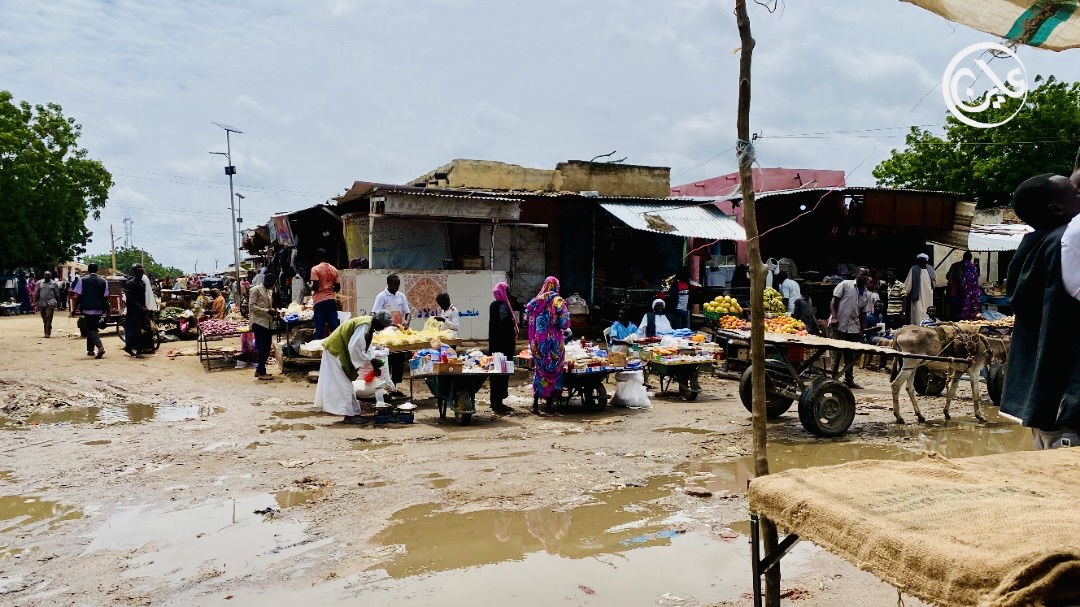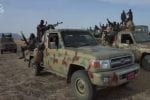South Kordofan: Thousands face starvation in Kadugli and Dilling with access routes cut off
17 August 2025
Military fighting around the cities of Dilling and Kadugli in South Kordofan state has cut off key supply routes and commercial activity, putting thousands of citizens in danger of starvation, local humanitarian workers told Ayin. The siege in both towns has led to prohibitively high market prices and suspected price gouging by military personnel.
Both towns are currently under control of the Sudan Armed Forces (SAF) but remain surrounded by the Rapid Support Forces and the allied Sudan People’s Liberation Movement-North (SPLM-N).
From August 6 to 10, over 3,000 people fled Kadugli, the capital city of South Kordofan State, the International Organisation for Migration (IOM) reported. Local residents reported that the ongoing insecurity and food crisis have triggered a mass displacement from Kadugli, estimating that a quarter of the city’s population has now left. Many displaced people have either relocated within the Kadugli locality or to the Habila and Ar Reif Al Shargi localities in South Kordofan, the same sources told Ayin.
The Rapid Support Forces (RSF) have tightened their control over key supply routes since April. After capturing the strategic Um Adara junction and later the Dashoul area—which connects Dilling to West Kordofan—the military blocked the main asphalt road linking both cities to El Obeid in North Kordofan. FIntense clashes in Al-Deibabat and Al-Hamadi resulted in restrictions on movement, which prevented cargo trucks from delivering supplies.
Attempts to bring food via alternative rough roads linking South Kordofan to Um Ruwaba and White Nile State have failed due to heavy rains and complete road closures, further exacerbating the crisis, according to volunteers with the Emergency Response Rooms (ERRs), local initiatives set up to support the conflict-affected.
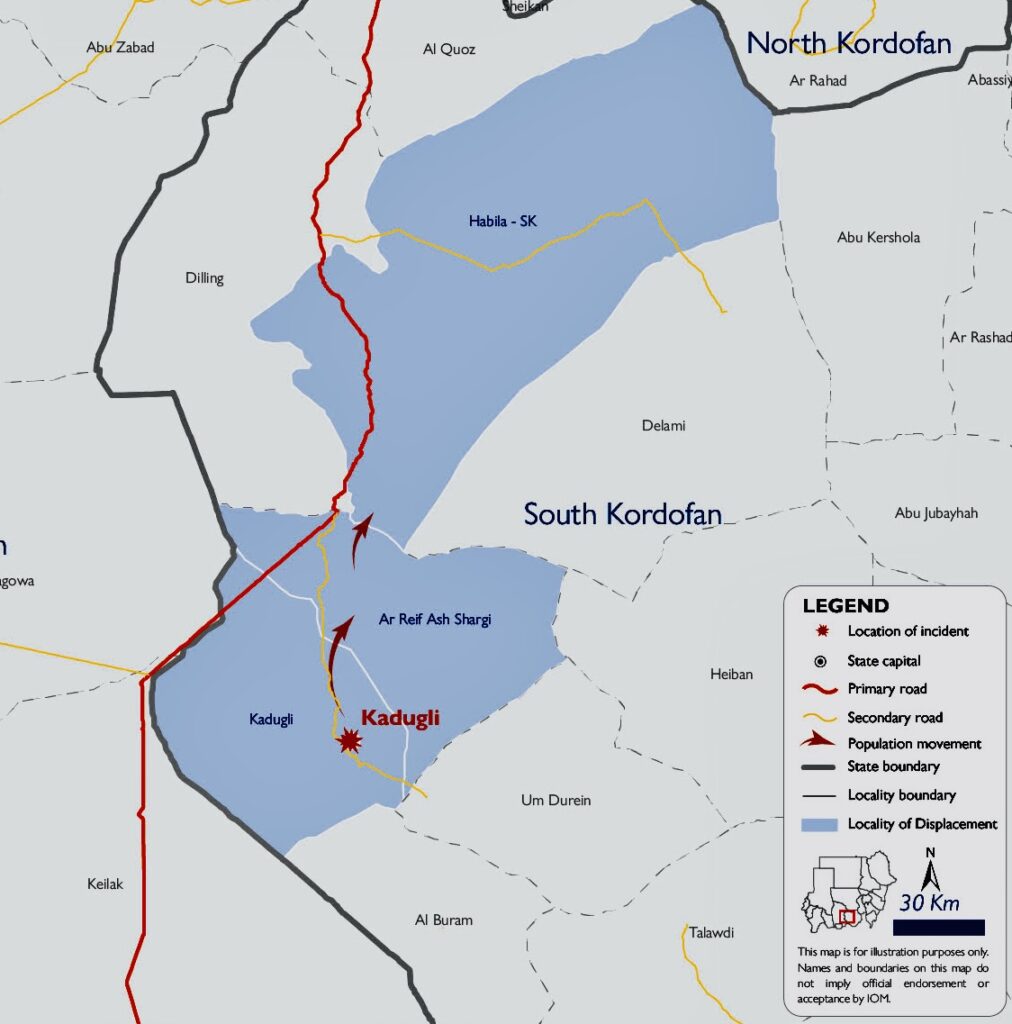
Severe scarcity as army blocks aid
The RSF and the SPLA-N are not the only culprits for Kadugli’s dearth of food and subsequent crippling market prices. Local residents report that the army has restricted food supplies within the city.
In April, SAF suspended the permissions of more than 30 humanitarian organisations, including international groups like the Norwegian Refugee Council, to operate in the city. Residents have also accused army authorities of stockpiling World Food Programme-delivered aid over the last two years.
On 17 July, thousands of people gathered at Kadugli market to protest the lack of maize and other foodstuffs. VViolence and looting occurred at shops and grain stores that are owned by the Sudanese army, amid accusations of monopolising corn supplies and starving civilians.
A local trader reported a 300% rise in prices compared to last year. A bag of onions is now sold at a staggering $56; a kilo of rice will set you back roughly $22 – prohibitively expensive prices that only a few within the conflict-ridden town can afford.
Ahmed Mohammed, an ERR volunteer in Kadugli, estimated that 90% of families are facing severe hunger, with food becoming either unaffordable or unavailable. SSeveral sources informed Ayin that children have been forced to live on the streets in search of food, as most shelves at home are empty. SSome women who lost their husbands in the conflict have turned to the streets as a desperate survival strategy.
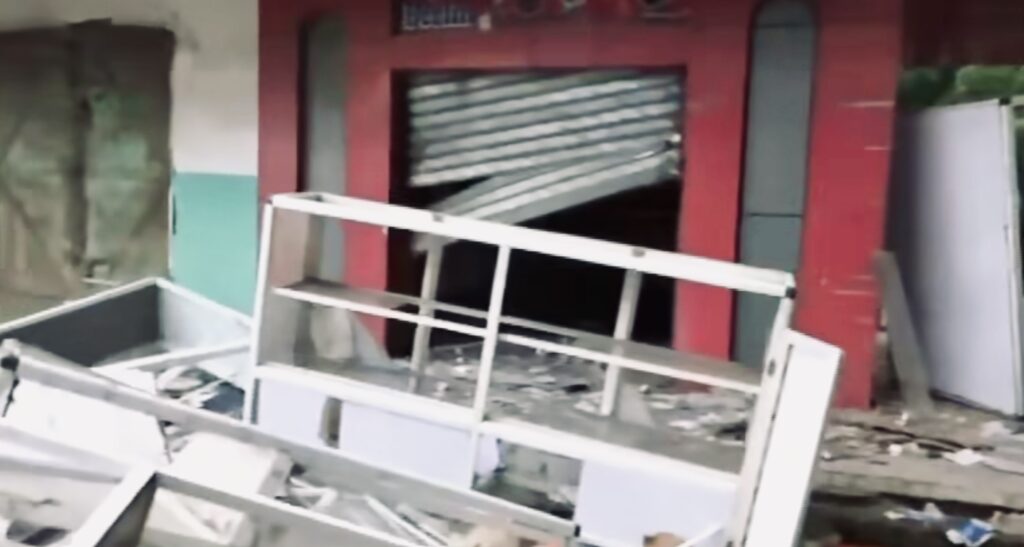
Community kitchen challenges
Local ERR volunteers reported that the community kitchens, which once served as a lifeline for thousands of vulnerable families in Sudan’s war zones by providing daily meals, are now struggling to continue their operations. A volunteer in the town of Dilling, South Kordofan State, reported that the 50 community kitchens, which once operated actively across the town, now function only sporadically. “The volatile market prices make it difficult to plan anything,” the volunteer said. “This is especially challenging when operating with limited resources from the start.”
Community activist Mumin Ezraq noted that these kitchens, which previously fed 150 to 300 families daily, now face severe shortages, worsening hunger in the besieged city. With the RSF’s control of supply routes effectively cutting off essential supplies for the state, the severity of the situation may be the worst ever experienced in this restive area, says social activist Al-Sadiq Issa.
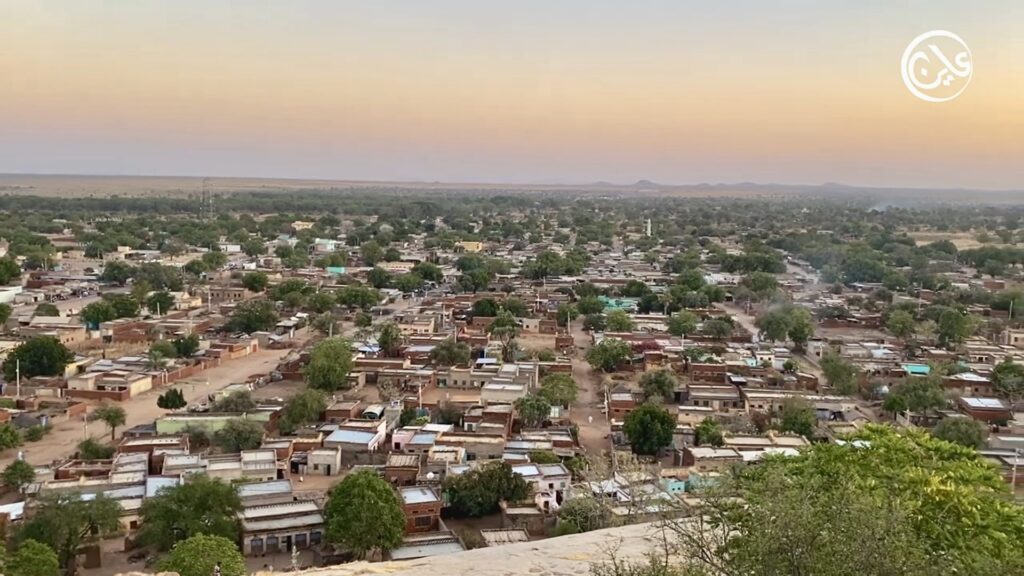
Collapsed clinics
The healthcare situation mirrors the food crisis. Hospitals and clinics in Kadugli and Dilling are facing severe shortages of essential medicines, including antibiotics, treatments for chronic diseases, malaria medications, and children’s medications, local medical staff told Ayin. Many facilities have either closed or are operating at limited capacity. Preventable deaths have become common because of the lack of medical services, according to the same sources.
“People are dying quietly, unseen,” said one aid volunteer who spoke to Avaaz, the international advocacy organisation. “Tuberculosis is spreading again. Night blindness, which is a symptom of vitamin A deficiency, is on the rise. There’s a dangerous shortage in blood supplies, and some health departments have simply closed their doors.”
Ibrahim Khamis Nourin of the Dilling ERR confirmed that the humanitarian situation is critical, with most residents unable to access food and medical care due to scarcity and inflated prices.
People are dying quietly, unseen
–Aid worker in Kadugli
“The siege imposed on South Kordofan State has led to a complete disruption in the supply of food and medicine to major cities, putting the lives of millions of civilians at great risk,” Khamis said. “During the past period, the United Nations World Food Programme attempted to deliver aid to South Kordofan State but failed, as security forces confiscated the relief convoy it was driving, making it almost impossible to enter the state.”
Khamis made an urgent appeal to the international community to take action and save the citizens of South Kordofan by pressuring the warring parties to open humanitarian corridors to facilitate the delivery of food and medicine, as civilians are paying the price for the blockade imposed by the military forces.
With the humanitarian crisis escalating, Sudanese activists launched a campaign, through the Youth Vision Initiative, to highlight the hunger experienced by the population in South Kordofan and encourage humanitarian actors to intervene urgently and save millions of civilians in the besieged state, according to those involved in the initiative.


